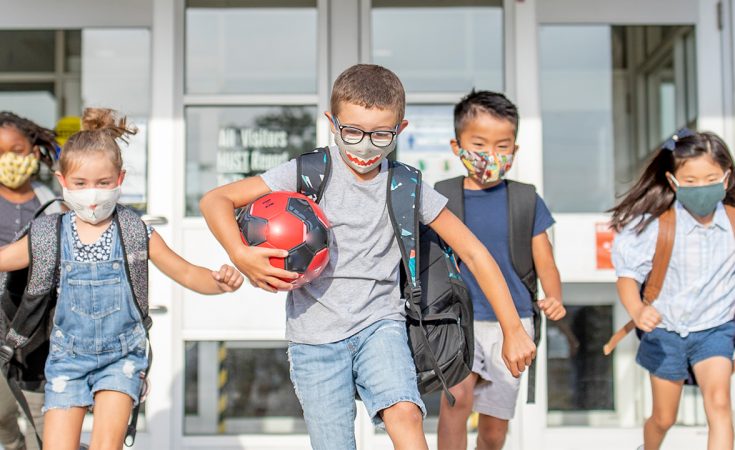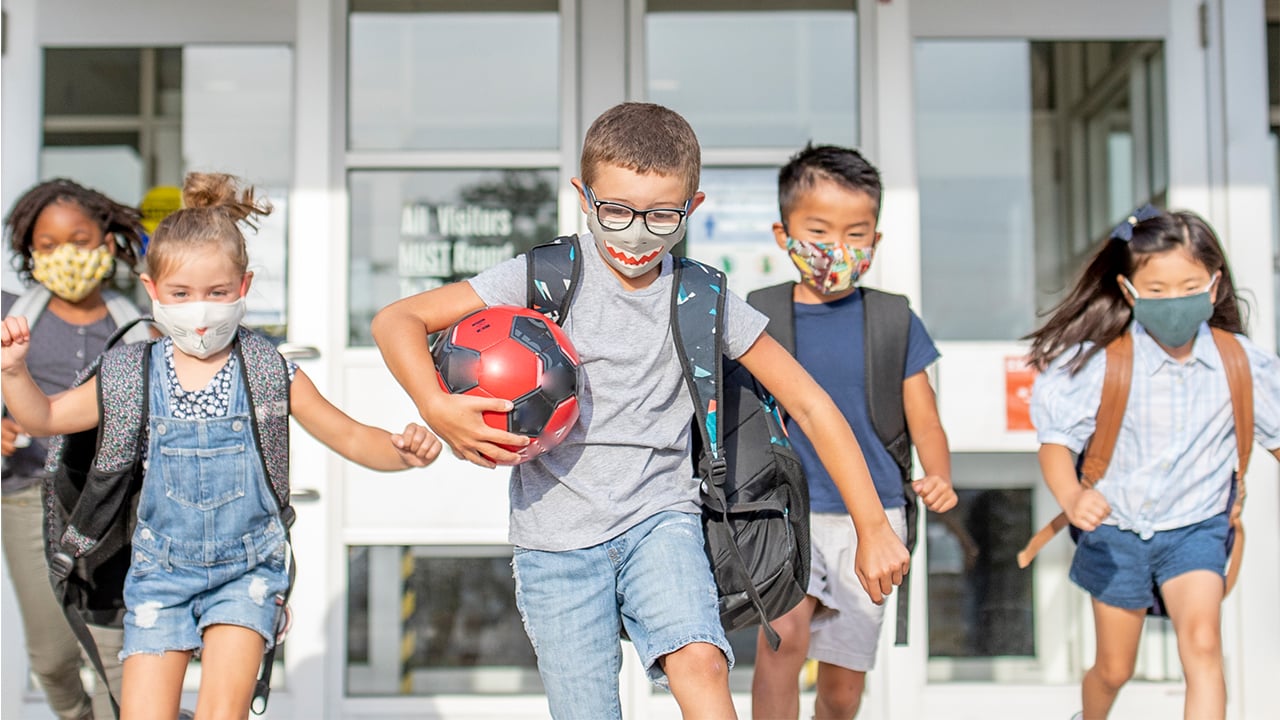Experts say the risk of myocarditis post-vaccine is incredibly low for kids. But if you’re still worried, here are five reassuring facts.
Myocarditis—it sounds super scary and not like something you want your kid to have. And now that COVID vaccines for kids 5-11 are approved in both the U.S. and Canada, you’ve probably heard somebody mention it. But what, exactly, is myocarditis? And how much should you worry about it?
Myocarditis is a form of heart inflammation. In the vaccine rollout last spring and summer, some teens and young adults, particularly males, experienced myocarditis after receiving their doses. This occurred more often after the second dose and typically within four to five days of getting the vaccine. (Heart inflammation was also more common in those who had received the Moderna vaccine than the Pfizer vaccine.) Of course, this gave parents pause. Is the vaccine still a good idea? Parents of school-age kids—who don’t, for the most part, seem to get hit as hard by COVID—may be wondering if the vaccine is worth the myocarditis risk for them.
It turns out the answer is a resounding yes. Here’s what we know so far about the risk of myocarditis in school-age kids from the COVID vaccine.
No kids in the Pfizer-BioNTech trial got myocarditis
So far, there is trial data on about 3,100 kids who have gotten the Pfizer-BioNTech vaccine in the U.S., Finland, Spain and Poland and none of them got myocarditis after the vaccine. That’s not to say that once you start vaccinating more kids you won’t see some cases. For example, in Ontario, the rate of myocarditis and pericarditis—inflammation of the lining of the heart—reported after an mRNA vaccine is 22 in a million doses. (Or, another way to think about it: 0.0022 per cent of all the vaccinated people in Ontario experienced this side effect.) As more and more kids get vaccinated, some cases of myocarditis and pericarditis might be identified, but Christos Karatzios, a paediatric infectious diseases specialist at the Montreal Children’s Hospital, says the lack of cases in the initial trial is still a good sign.
“You don’t need to vaccinate 10,000 kids to see one case of myocarditis. You could still by chance see one, and they didn’t,” he says.
Myocarditis from the vaccine is easily treatable
Even though myocarditis and pericarditis sound quite serious, doctors are trying to reassure parents that it’s actually not as scary as you might think.
“It sounds bad, but most kids just have chest pain. They take some anti-inflammatories and they recover,” says Jeff Kwong, an epidemiologist with an interest in vaccines and a family physician in the Toronto Western Family Health Team. Generally, there is no lasting damage.
In Montreal, Karatzios saw four teenagers over the summer with myocarditis post-vaccine. “They got their vaccine and then within a few days they felt chest tightness, chest pain, and every time they would take a deep breath, it would hurt. Or they were playing soccer, they couldn’t keep up and they were tired,” he explains.
Testing at the hospital showed they were experiencing myocarditis (their blood work had high heart inflammatory markers). “This isn’t a heart attack,” assures Karatzios, who says these patients all recovered quickly with intravenous fluids and ibuprofen.
Kids have a generally low “background risk” of myocarditis
According to Kwong, kids, in general, get myocarditis at lower rates than other age groups. “We’ve looked at hospitalizations and emergency department visits for myocarditis pre-pandemic, and it’s a lot lower in the 5-11 and the 12-16 age group compared to 16-19 and 20-24,” he says.
This bodes well for what we might see in terms of rates of heart inflammation post-vaccine in a younger age group, he explains. “The background risk is a lot lower in these younger kids. So even if the COVID vaccine was to increase the risk by a certain factor, it will have less of an effect. We’ll see fewer cases, just because they have a lower baseline risk.”
Spacing the doses eight weeks apart may decrease any myocarditis risk
According to Canada’s National Advisory Committee on Immunization (NACI), some data from the U.K. and Canada has suggested that in adolescents, extending the interval between vaccine doses to eight weeks apart (instead of three weeks apart) may reduce the risk of heart inflammation even further (in addition to increasing vaccine efficacy). That’s why Canadian immunization officials decided to recommend a longer interval here, in most circumstances. Additionally, because the majority of myocarditis and pericarditis incidents happen after the second dose, and because the U.S. is doing a three-weeks-apart vaccine schedule, we may have more data on myocarditis safety by the time Canadian kids actually get their second shots.
Kids who get COVID are at risk of other heart issues
It’s important to remember that your kids are more likely to experience heart issues caused by a COVID infection than as a side effect from the COVID vaccine. According to data from the Centers for Disease Control (CDC), kids with COVID have a 30 times higher risk of myocarditis compared to kids without COVID. Looking at data from 900 hospitals, they found that from March 2020 to January 2021, out of 65,000 kids under 16 diagnosed with COVID-19, 86 were diagnosed with myocarditis. Only 132 out of 3.7 million kids without COVID developed myocarditis.
This is because viruses, including COVID, can lead to inflammation of the heart muscle. “COVID targets our ACE receptors,” explains Karatzios. “ACE receptors are what controls our blood pressure and they are found throughout all our blood vessels, throughout our heart muscle, through the smooth muscle all throughout our veins and arteries, and our hearts.”
To Karatzios, what’s even more concerning is the risk of multi-system inflammatory syndrome in children (MIS-C), which can affect the heart, lungs, kidneys, brain, skin, eyes or gastrointestinal organs and usually comes on two to six weeks after an initial COVID infection (even if the COVID infection was mild). “During the second wave, I was seeing about one to two cases a week on average. Forty percent of children with MIS-C, at least in our cohort here, needed to be in the ICU because of cardiac dysfunction.”
Both Karatzios and Kwong think it’s a mistake to downplay the risks of COVID in kids and that the vaccine will offer benefits that outweigh the risks. With myocarditis, Kwong says, “We’re kind of fixated on one semi-bad thing. Versus a bunch of potential semi-bad things, or even really bad things, that could result from a COVID infection.”



































